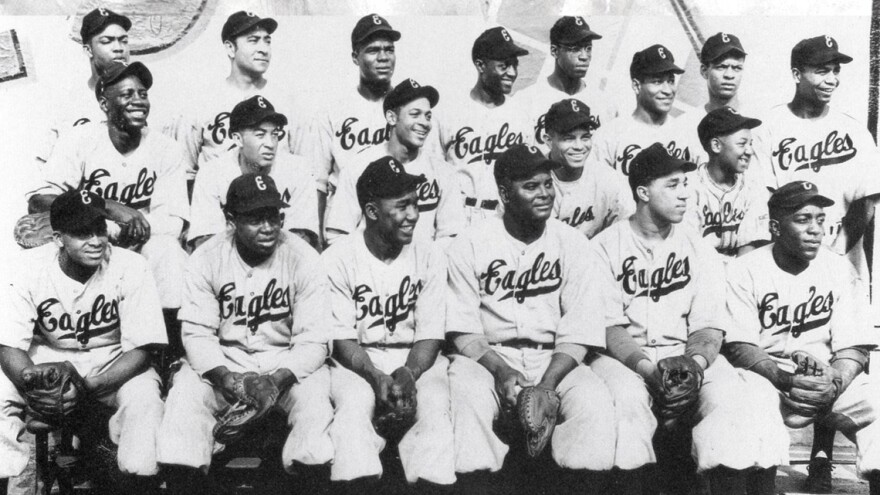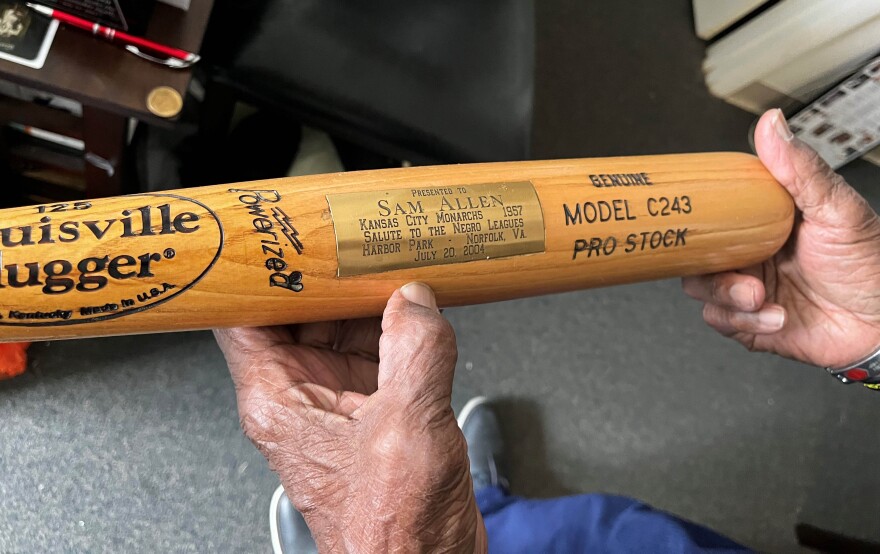Read the original story on WHRO's website.
Sam Allen’s apartment near Norfolk State University is covered wall to wall with pictures.
There are lots of old baseball rosters, photos of people like Jackie Robinson and even one of 86-year-old Allen meeting former President George W. Bush.
There are plaques, medals and trophies too. One tucked on a shelf reads “Negro League Legend Hall of Fame - Mr. Sam Allen.”
Allen’s mementos hearken back to Hampton Roads’ long, proud baseball tradition.
And Allen himself is a living reminder of the special place baseball held in the Black community before the end of segregation.
“A religious experience”
In the 1930s and ’40s, baseball was everywhere in Hampton Roads.
Seemingly every little town and neighborhood had their own teams of local amateurs who played to local crowds.
Clay Shampoe literally wrote the books on baseball history in Portsmouth and Norfolk. The proximity made for a great rivalry between the cities.
”They would have Sunday doubleheaders. And the first game would be maybe in Portsmouth, and the teams and the fans would jump on the ferry and go across and they'd go to the other ballpark and play the second game,” Shampoe said. “You can imagine how rowdy that ferry got."

The games were big social outings. The Black teams would play on Sunday afternoons, so the bleachers would be filled with folks in their Sunday best.
“It was almost a religious experience,” Shampoe said. “After going to church and then you go to see your favorite team play in the afternoon was something very, very special to the Blacks at that time.”
While segregation was the law of the land, one of the few places in Portsmouth where the races mixed were in the stands at the baseball games.
Bruce Ebert works with Portsmouth Libraries, which is hosting an exhibit called "Rooting for the home team: Portsmouth’s Black baseball players, promoters, and parks."
He said Portsmouth Stadium owner Frank Lawrence decided anyone could sit anywhere they could afford a ticket.
The same wasn’t true in neighboring Norfolk, where the Norfolk Tars played.
“Then, the Norfolk team had a policy of requiring Black fans to sit in the left field bleachers,” Ebert said. “Finally, there was a movement among the Black baseball fans, ‘We don't want to take this because Mr. Lawrence across the river is letting us sit anywhere we want.’”
Despite Norfolk fielding a championship team in 1953, those left field bleachers were empty game after game.
“The Black baseball fans of Norfolk did the baseball equivalent of voting with their feet. And they got in their cars and they drove to Portsmouth to see baseball,” Ebert said.
Attendance dropped so much that Norfolk's stadium seating was integrated the following season.

The legend of Sam Allen
Norfolk’s Allen has fond memories of the Portsmouth Stadium as a fan.
“The bleacher seats didn’t cost but 50 cents, so in the evening, that's what men did. You didn't have a television, you just had baseball,” he said. “So every night we'd go to the baseball game.”
And he said he liked the stadium as a player — primarily because of its short center field.
“When we played with the West End Giants and I was the lead off batter, the first pitch, I hit a home run straightaway center field of Portsmouth Stadium,” he said.
He played locally, becoming a talented and quick high school player. As a result, Allen even got to play a couple of games with the legendary Willie Mays.
Mays had been drafted and stationed at Fort Eustis in the early 1950s, so he played with a traveling all-star team to make extra money on the weekends. Mays' team asked Allen to play with them in Lynchburg one Sunday.
“After the game, they said, ‘We’re going to Winston-Salem.' I thought we were coming back to Norfolk,” Allen recalled. “We played the game that Sunday afternoon in Lynchburg, then we went to Winston-Salem that night and then we had to ride back to Norfolk. I said, ‘I don’t know about baseball,’ but then fell in love with it. And I was pretty decent.”
"Pretty decent” may be an understatement. Allen played in the Negro Leagues between 1957 and 1960. He was the left fielder for the championship-winning Kansas City Monarchs in his first year in the League. He batted .295 for the season.
“I was the lead-off batter. I led the league in runs scored,” he said.
Criss-crossing the country by bus in the late 1950s, Allen said sometimes they’d roll into town and find restaurants wouldn’t serve a team full of Black players.

“We’d be traveling, especially down South, you’d go to places you couldn't get anything to eat,” he said. “Dairy Queen served everyone through the window, so we always tried to find a Dairy Queen.”
Allen’s storied career was cut short when he was drafted by the Army in 1960. When Allen got out of the military in 1962, the Negro Leagues were basically defunct.
The Boston Red Sox became the final Major League team to integrate in 1959. Black players were recruited and playing for the big teams, and the Negro Leagues petered out.
Allen spent the next few decades working different jobs as a longshoreman and carpet salesman while Major League Baseball largely ignored the Negro Leagues and their players.
Eventually, initiatives recognizing the contributions of those Black players started to take hold in the sport.
Now, Allen gets a pension from the MLB, which officially recognized the Negro Leagues as major leagues in 2020.
The league flies him out to the All-Star Game every year in recognition of his involvement.
“Life is good,” Allen said.
Rooting for the Home Team is on display now at 904 Elm Ave., Portsmouth.


